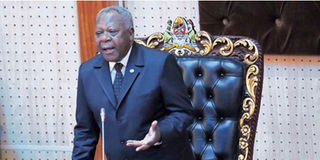Unsung hero of pluralism

Former Speaker of the National Assembly, the late Samuel Sitta.
What you need to know:
- As the minister for Justice and Constitutional Affairs, Mzee Sitta, who passed away yesterday night at the Technical University of Munich Hospital, was the key government official who supervised and steered constitutional and legal changes to for switching to multiparty democracy in Tanzania, Former Premier John Malecela said yesterday.
Dar es Salaam. Former Speaker of the National Assembly Samuel Sitta was the unsung hero of the transition to multiparty democracy in the country in the early 1990s, a cross-section of Tanzanians told The Citizen yesterday.
As the minister for Justice and Constitutional Affairs, Mzee Sitta, who passed away yesterday night at the Technical University of Munich Hospital, was the key government official who supervised and steered constitutional and legal changes to for switching to multiparty democracy in Tanzania, Former Premier John Malecela said yesterday.
Mr Malecela who was the PM from November 9, 1990 to December 5, 1994, said it was Sitta who prepared and supervised enactment of the Political Parties Act of 1992 legally re-established multiparty democracy in 1992. “He discharged his duties with integrity, honest, patriotism, speed and standards, which enabled the country to restore multiparty democracy peacefully,” Mr Malecela, who has since retired from active politics, said.
“Tanzania’s political achievements cannot be celebrated without remembering his contribution. Young politicians need to emulate Sitta’s work ethics,” he noted.
More tributes came from current and retired national leaders, activists and ordinary wananchi.
President John Magufuli said in a statement signed by Director of Presidential Communications Gerson Msigwa that Sitta would be remembered for his industriousness, patriotism and advocacy of what he believed in.
“Allow me to convey my condolences to the widow Magreth Sitta who is also the Urambo East MP, family members, MPs, residents of the Urambo East and all those who have been touched by his death,” reads a statement Ikulu sent to the Speaker of the National Assembly.
Former President Jakaya Kikwete wrote in his Twitter account that he has been deeply saddened by Sitta’s demise.
“I join Tanzanians in mourning Mzee Sitta’s death. May he rest in peace,” said Mr Kikwete.
For his part, Sitta’s predecessor in the Speaker’s seat in the National Assembly, Mr Pius Msekwa, said the deceased would be remembered for roles he played in 1993 in the Parliament when serving as the Justice and Constitutions Affairs minister.
Mr Msekwa who was serving as Deputy Speaker at that time said he and Sitta handled together the two highly contentious issues. These were the MPs’ demand for the reinstatement of the Tanganyika government and Zanzibar’s joining of the Organisation of Islamic Cooperation. It was a grouping of MPs known as the Group of 55 or G55 who, after learning that Zanzibar had joined the OIC, demanded the return of the government of Tanganyika, which had died a natural death in 1964 following the union between Tanganyika and Zanzibar.
“It happened that then Speaker, Chief Adam Sapi Mkwawa, had fallen sick and I had to preside over parliamentary proceedings. We therefore handled the debate before the Parliament voted to restore Tanganyika,” Mr Msekwa said in a telephone interview yesterday.
With regard to Zanzibar joining OIC, Mr Msekwa said: “Sitta stood firm and intelligently argued against it. At the end Isles leaders admitted to have made a mistake, apologised and pledged to withdraw from the OIC,” he said.
Mr Ibrahim Kaduma, a former Cabinet minister and vice chancellor of the University of Dar es Salaam, said he had known the late Sitta when working with the Capital Development Authority (CDA) in Dodoma, in the Cabinet and at the Tanzania Investment Centre (TIC).
As Speaker, Sitta treated all MPs equally regardless of their political affiliations.
“Tanzanians should celebrate his life and appreciate the service he rendered to the nation” Mr Kaduma said.
Speaking to The Citizen on behalf of the civil society organisations, Mr Onesmo Ole-ngurumwa said Sitta has passed away at a time when his experience was highly needed in the ongoing issues of transformation.
He said apart from leading a Parliament sitting he dubbed “The Standards and Speed Parliament”, he ensured justice and inclusiveness prevailed. “Leaders of the 11th Parliament should learn from what he did,” he said.
A statement issued by CCM said the ruling party has been saddened by Sitta’s demise, describing him as a hardworking and honest leader who identified himself with “speed and standards” working philosophy.
Kigoma Urban MP Zitto Kabwe said in his obituary that the nation has lost a reformer who made significant changes to Bunge regulations when leading the National Assembly.
“He made changes to committees allowing Controller and Auditor General’s (CAG) report to be read and debated in Parliament. It’s through such changes the now defunct Public Organisations Accounts Committee (POAC) was formed and chose me first chairman,” he said.
Former Kigoma South MP David Kafulila and East African Legislative Assembly member from Tanzania, Ms Shy-rose Bhanji, said Tanzania has lost a political tiger through whom the Coalition of Constitution Defenders popularly known by its Kiswahili acronym, Ukawa, was formed.
“During his political life, he lead EAC docket among other ministries. He leaves a good legacy. His passion for EAC integration was immense,” writes Ms Bhanji in her tribute copied to The Citizen.




